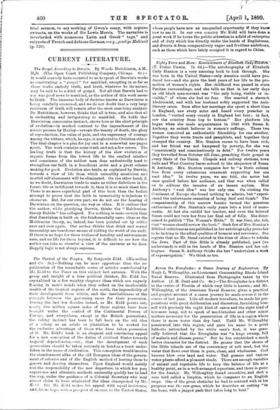Eighty Years and More : Reminiscences of ElTsOetk e47MM' (T. Fisher
Unwin. i s. 6d.)—The autobiography of Elizabeth Cady Stanton is a very amusing book to look through. She was born in the United States—only America could have pro. duced her—and she gave the best years of her life to the pro- motion of women's rights. Her childhood was passed in stern Puritan surroundings, and she tells us that in her early days an old black man-servant was "the only being, visible or in- visible," of whom she bad no fear. She married a staunch Abolitionist, and with her husband nobly supported the Anti- Slavery cause. Soon after her marriage she spent a short time in England, saw every actor and heard every preacher in London, " visited every county in England but four; in fact, saw the country from top to bottom." Her platform life began when she made acquaintance in 1849 with Susan B. Anthony, an ardent believer in women's suffrage. These- two women conceived an enthusiastic friendship for one another. Together they wrote tracts and pamphlets, and together they stumped the country. Mrs. Stanton seems to have been rich, and her friend was not hampered by poverty, for she was "consistently and conscientiously in debt." For twelve years they travelled from October till June, preaching their gospel in every State of the Union. Chapels and railway stations, town balls and West Country barns echoed to the eloquence of Susan B. Anthony. Mrs. Stanton compares her to " a Doric column free from every extraneous ornament supporting her one vast idea." In twelve years, we are told, she never but once quailed before her audience, and that was when called on to address the inmates of an insane asylum. Miss Anthony's " vast idea" was her only one. On visiting the Continent of Europe she found nothing to admire, but " experi- enced the unfortunate sensation of being deaf and dumb." The companionship of this narrow fanatic turned the generous enthusiasm of Mrs. Stanton's early years into a kind of mono- mania. At last she outdid her teacher, and even the beloved Susan could not turn her from her final act of folly. She deter- mined to publish "The Woman's Bible." It was time, she felt, that " women should review the book." Such few of Mrs. Stanton's • Biblical criticisms as are published in her autobiography prove her to be lacking in the allied qualities of humour and reverence. She regrets that no Mr. Stead existed in the time of Moses to rebuke the Jews. Part of this Bible is already published, part (we understand) is still in the hands of Mrs. Stanton and her col- leagues. Susan 13. Anthony thinks she has "undertaken a work of supererogation." We think so too.






































 Previous page
Previous page